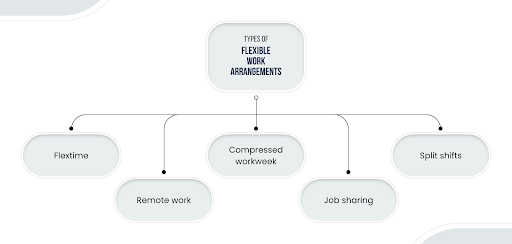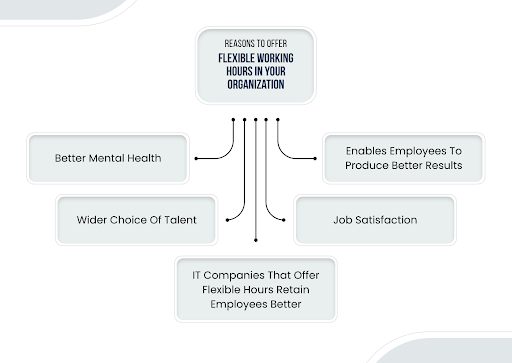Why Businesses Should Consider Flexible Hiring of IT Staff from India?
flexible

Reduced workweeks. Working from home. Remote work flexible hours of employment! Although you might believe they are merely a fleeting fad, facts show otherwise.
One of the top benefits that IT employees today want from their companies is work-life balance. But even that may seem like an impossible challenge.
Nervous tension is brought on by such tight job schedules. Professionals in the workforce frequently battle with poor health, constant stress, and emotional issues.
What exactly are flexible working hours in this situation?
To begin with, flexible working hours don’t necessarily indicate that a manager may be a bit lax and let the IT staff depart a little early.
Work-life balance and flexibility were rated by 55% of IT employees as being extremely significant factors in their job satisfaction, according to SHRM.
Notwithstanding this, it is astonishing that so few businesses provide flexible work schedules. Continue reading to learn more reasons why you should change to a more flexible work schedule if you still need persuading.
Types of Flexible Work Arrangements
Depending on where the flexibility element is situated, there may be many sorts of flexible work arrangements. Flexibility may be permitted, for example, with regard to working hours or perhaps the location of the workplace.


1. Flextime
Employees can set their own schedules and work hours under the flextime concept. They are free to choose the hours they work as long as they meet their weekly hourly quota, which for full-time employees is generally 40 hours.
For professions where time zones don’t matter, the flextime paradigm is prevalent. Thus, in this instance, the employee will report for work for 40 hours each week on a schedule that works for them. They may want to work some sessions at midday and the remainder after midnight rather than from 9 to 5. As long as the task is completed, it doesn’t matter.
2. Remote work
We started to realize that we are not paying for seat warmers but for a job well done when companies were forced to allow employees to work from home.
Do you still have any doubts about how well your remote workers are doing? Imagine if businesses like Twitter regularly permitted their staff to work from home (if they wanted to). Working remotely is not always the same as working from home because employees can do it from anywhere.
3. Compressed workweek
Another sort of work arrangement that may be appropriate for some job profiles is a compressed work schedule. In plain English, a compressed workweek involves putting in long hours on certain days and taking more days off on others.
4. Job sharing
Job sharing is a notion that is advantageous to both businesses and employees. A part-time worker who is unable to work 40 hours per week might essentially “share their employment” with that person. Consequently, there’s going to be two workers working part-time rather than one full-time.
Companies that work with remote freelancing teams frequently engage in job sharing. By definition, it’s quite comparable to working many part-time jobs rather than devoting all of your time to one business.
5. Split shifts
For instance, you can divide your shift into two, 4-hour halves rather than performing a full 8-hour shift. By doing this, you free up some space in between to handle personal responsibilities.
Depending on the nature of your firm, you may change all of these flexible scheduling options. The number of flexible schedule options is endless, despite the fact that those five are the most popular ones.
Some companies provide flexible vacation policies or choose to hire developers from India (project-based). Others use a mixed approach.
Reasons to Offer Flexible Working Hours in Your Organization
There are several benefits for your organization from having a flexible work schedule. Here are 5 benefits that encourage a more flexible IT workplace:


1. Enables Employees To Produce Better Results
It’s a little unreasonable to assume that every IT employee will work from 9 to 5 at their peak efficiency.
Employees with rigid work schedules spend a bit more time checking the time than they do actually working. As a result, their timelines are impacted. The outcome is a sharp decline in the work’s quality.
Flexible work hours allow IT employees to work when and where they are most effective. For some, it may entail working through the night from home. Some people might want to work full-time from another area remotely.
The post “Why Businesses Should Consider Flexible Hiring of IT Staff from India?” claims that IT staff flexibility has helped IT staff succeed. Employee flexibility has enhanced output and:
- Employee morale
- Job satisfaction
- Efficiency
- Overall business profitability
2. Job Satisfaction
Millennials will make up 50% of the workforce within the next two years. Additionally, work happiness is more important to millennials than a large wage.
79% of workers with flexible work schedules said they were pleased or extremely satisfied with their jobs, according to Stats Canada.
Both companies and workers profit from flexible work arrangements. To combat the monotony of the standard work week, several organizations are switching to a 9/80 work schedule, and thus far, this variance has been successful for them.
When workers have greater control over their working hours, they are more likely to be content. Offering flexible work schedules will therefore promote contentment. Additionally, profitable business growth is fueled by contented workers.
Additionally, a flexible work schedule improves interactions between companies and employees. IT employees feel supported by their bosses because of flexible working hours.
3. IT Companies That Offer Flexible Hours Retain Employees Better
The significance of staff retention doesn’t need to be reiterated. Additionally, consider the cost of staff turnover.
According to studies, IT employees who have flexible schedules tend to be happier than those who work traditional 9–5 occupations. Additionally, flexible working arrangements guarantee continued high levels of worker involvement.
Flex employees are much more likely to remain around even in difficult times because flexible work hours provide them with a higher level of job satisfaction.
If we include millennials, flexible work schedules become more important. Perks and advantages are more important to millennials than income. Therefore, you need to be a little more imaginative than the typical large fat compensation in order to keep top talent.
Flexible work schedules are unquestionably among the most significant bonuses you can provide. you can also hire app developers in India remotely to develop scalable web application.
4. Wider Choice Of Talent
The hiring process is significantly impacted by flexible work arrangements.
Recruiting is a difficult job given the number of firms providing various incentives. Top talent doesn’t even consider working for organizations that don’t meet their demands.
A typical 9–5 employment is one of the primary downsides that businesses focus on.
Once you dispel that false impression, you have access to a far wider range of talent.
This is especially true for younger IT staff who value flexibility highly.
Top talent is more likely to be drawn to companies that are at ease with offering flexibility to their workers. In addition, a lot of millennials like part-time jobs, remote work, or simply a different schedule from the standard 9 to 5.
Overall, by promoting a flexible working schedule, you increase the likelihood of attracting and even recruiting outstanding individuals.
5. Better Mental Health
It is debatable if the 9–5 workday is effective because it appears to be detrimental to people’s general well-being.
The present mental health of the workforce is the area that suffers the most. Employee stress levels appear to have been high in such a work setting.
Even those who are passionate about their employment experience stress. Sometimes all you need is a break from the workplace politics and chatty coworkers to focus on your work.
A worker can be more productive if they work in a calm setting free of any mental tension that can demoralize them.
Wrapping Up!
If you allow your IT employees to use their own work schedules, they won’t start arriving late.
In fact, it could seem that the opposite is true. Productivity may increase for both individuals and businesses. Also, you can contact IT staff augmentation companies in India in order to enhance flexibility for your IT staff.
One may test a flexible work schedule for your company for a week or for a month to see whether it works if you’re still unsure.
FAQs
1. What are the benefits of having a flexible workforce?
A flexible workforce model can result in quantifiable, up-front benefits that are easy to evaluate and can be utilized to determine the growth and general health of a company. The key benefits of using a flexible staff are as follows:
- Reduced overhead
- Access to talent
- Speed and scale
- Long-term return on investment
- Multi-generational support
- Loyalty and productivity
Long-term benefits arise from utilizing the on-demand workforce in addition to financial savings, the borderless talent network, and effective workflows.
2. How does flexible working reduce costs?
Reducing costs is one of the main benefits of flexible working arrangements, especially for startups.
If an employee works flexibly, the direct costs of keeping them at a desk, such as internet access and other office expenses, are dramatically decreased.
A company can also decrease expenses by reducing the number of individual office spaces and using a shared or co-working facility instead.






